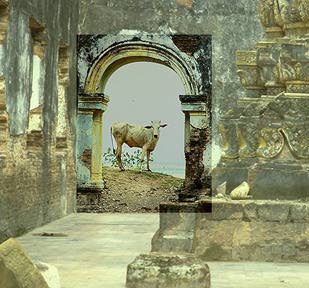The Remaining Right Side of the Buddha
by Gregg Butensky
all photos © Gregg Butensky
When the Australian journalist, John Pilger, arrived in Cambodia in the summer of 1979, the Khmer Rouge had already been out of power for eight months; their brutal rule brought to an end by a Vietnamese led invasion. By that time, only three relief planes had arrived from the West. Flying into Cambodia, Pilger described the scene;
"My aircraft flew low, following the unravelling of the Mekong River west from Vietnam. Once over Cambodia, there appeared to be no-one, no movement, not even an animal, as if the great population of Asia stopped at the border. Nothing seemed to have been planted nor was growing, except the forest, and the mangrove and lines of tall wild grass. On the edge of towns this grass would follow straight lines, as though planted. Fertilized by human compost - by the remains of thousands upon thousands of men, women and children - those lines marked common graves in a nation where as many as a million-and-a-half people, one fifth of the population, were 'missing'."
("Return to Year Zero", New Internationalist, April 1993)

Table of Contents
 Part 1: Intro
Part 1: Intro
 Part 2: Udong Danger
Part 2: Udong Danger
 Part 3: Cooling-off Period Begins
Part 3: Cooling-off Period Begins
 Part 4: The Election Approaches
Part 4: The Election Approaches
 Part 5: Choeung Ek - The Killing Fields
Part 5: Choeung Ek - The Killing Fields
 Part 6: Polling Begins
Part 6: Polling Begins
 Part 7: Good News From The Front
Part 7: Good News From The Front
 Part 8: Making Plans for Siem Reap
Part 8: Making Plans for Siem Reap
 Part 9: To Angkor
Part 9: To Angkor
 Part 10: A Day and Night Amongst the Temples
Part 10: A Day and Night Amongst the Temples
 Part 11: More Angkor
Part 11: More Angkor
 Part 12: Flying With Goats - The Return to Phnom Penh
Part 12: Flying With Goats - The Return to Phnom Penh
 Reprise: "Lear Heouy"
Reprise: "Lear Heouy"
On the day of my arrival in Phnom Penh, many people were heading in the opposite direction - out of the country. On that day, Saturday, May 15, 1993, all UNTAC (United Nations Transitional Authority in Cambodia) family members residing in Cambodia were evacuated to Bangkok.
That same day, the royalist party deputy chief in the northern town of Siem Reap was shot dead. The previous Thursday night a district chief and an activist of the Buddhist Liberal Democratic Party (BLDP) were shot dead. Now the Thai air force stood ready to evacuate all Thai nationals. The Khmer Rouge, once again, shelled the airport in Siem Reap. Many aid workers stationed in the provinces had been returning to Phnom Penh out of fear for their lives and some of the volunteers who were to work at the polls had fled the country. Civpol (civilian police) from Hungary and Sweden joined some Japanese in deserting their posts in the wake of the murder of a Japanese Civpol. BLDP chief, Son Sann claimed that 30 BLDP workers had been killed since April 7.
The country was about to embark on a six day general election for the first time in recent history to elect a 120-person Constituent Assembly.
A recent front page article in the New York Times had summarized the situation:
"The United Nations insists that it will go forward with the election even though it is taken for granted that the last two weeks of the campaign will be a frightening, violent time - and that the weeks after the election may be worse as the armed factions jostle for control of the new government."
Journalists, on the other hand, had been flowing into the country at a high rate - the Capitol Restaurant had become a hangout for reporters and photojournalists. The seating area of the unassuming restaurant spilled out onto the sidewalk through two open sides stopping just short of the muddy curbs. Anecdotes and the news of the day were shared while Phnom Penh life teemed in the street out front. Local children and cripples hawked books and magazines and occasionally sat for a spell to exchange a smile.
Most everyone hanging out at the Capitol had come to Cambodia in some professional capacity - whether journalist or aid worker, they had come with a specific purpose. I, on the other hand, had come motivated merely by curiousity. Jack - an American - had also come only as a traveller. We met at the Capitol and over the next few days, became friends and travelling companions. |